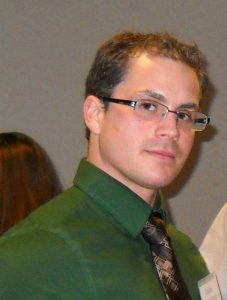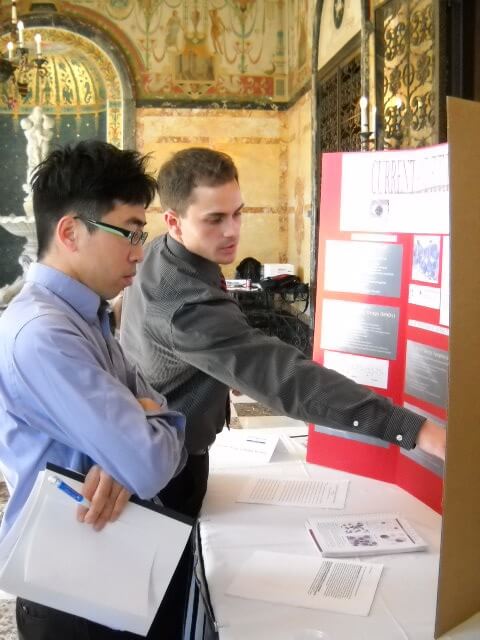BS in Clinical Lab Sciences, 2010

My college career began with little direction on where I wanted to go professionally. But I was certain in my desire to attend Monmouth University. I applied early decision with high hopes and was exuberant when I received the acceptance. I set my schedule, packed up my bags, and headed away from home to begin a rewarding journey. Being outgoing and generally fascinated by everything can be a blessing and a curse; I take interest in many different things but deciding on one can be a challenge. In the first year I found human physiology to be a subject of awe. I also found an affinity for the laboratory. I had an idea in my head to work for the Department of Defense as a microbiologist researching indigenous microbes overseas to protect our troops and defend civilians at home. Although this dream never happened it is nice to know it is still an option down the road.
Dr. Zielinski, my advisor, suggested the Clinical Laboratory Science joint degree with the University of Medicine and Dentistry of New Jersey. We went over the coursework and requirements, discussed a schedule, and put it all on paper. I did my own research on the kind of work and the educational process and found it quite promising. The field is in rapid expansion and drawn to new graduates for employment. Top it off with an undergraduate degree bearing titles of two great institutions – can’t beat that! My fascination for the human form came while studying Anatomy and Physiology with Dr. Mack. It was my first undergraduate level science class. Right from the start the course had me wide-eyed on the complexity of man and just how much harder I was going to have to work to make it through college. Dr. Mack is a master of making sure you pay attention to significant details.
The clinical laboratory component of my education did not take place until my senior year when attending UMDNJ. My first three years at Monmouth University gave me the chance to become involved around campus developing my basic laboratory skills, critical thinking, and personal relationships. I had many influential professors who served both as inspirational figures and role models. Where many college students nationwide dread organic chemistry as some impossible language I found myself in excellence. Every science student must learn a new way to think required for complex scientific concepts. I owe it to Dr. Lamberto (and coffee) for the endless hours spent working to develop that process of scientific conceptualization. When it finally clicked, the world opened up and I felt fully capable of reaching for the highest level in my professional and educational career. I even took the Advanced Organic Chemistry class not because I had to but for personal enrichment. I did well.
In younger years I was an avid musician playing a number of instruments with a strong classical foundation. I truly believe learning music early in life hardwires the brain in such a way that more complex levels of thinking become natural. The individual more readily grasps a variety of perspectives on a given subject. Any music student at Monmouth University can tell you about the difficulties of studying music theory of relativity. Many of the great scientific minds, both present-day and historically, had some form of musical training in their youth. I have to thank Monmouth for that: I learned how to think independently and with confidence.

I learned that involvement early on with a professional organization provides a wealth of knowledge and exposure to the possibilities of a career path. Being involved with ASCLS (American Society of Clinical Laboratory Sciences) as a student exposed me to the vast realm of laboratory medicine while networking with new and experienced scientists. In addition, there is a plethora of interesting roles a clinical laboratorian can fill that are not so obvious early on. I’ve met many people who wear hats and fulfill tasks that are “outside the box.” I decided to become more active in ASCLS-NJ as a state delegate at the national conclave in 2011 and recently became the Student Forum Advisor. At this year’s ASCLS-NJ Spring Seminar I was awarded the Key to the Future award. If I had the chance to go back and change something about my experience at Monmouth it would to be to be more involved with professional organizations, research projects, and presentations. Research, of any format both heightens intrigue in a topic and develops the necessary skills needed to reach the highest potential. I never thought I would have such an interest in hematology until doing research of Plasma Cell Myeloma. During my senior year I led a small team of students under the supervision of Dr. Keohane at UMDNJ to create a case study on a patient with a long history of this condition. Another master on detail, it was almost frustrating how much revision and editing would be done. Just when I thought my case study was complete she found something else to modify. I kept telling myself it is for the better. When I looked at the email timestamp of something close to 3AM it reminded me that she really wanted everything to be up to full potential. We presented our work at the ASCLS-NJ Fall Seminar and I submitted my own miniaturized version at Monmouth University. Although all of the research was bibliographical I did learn how to interpret scientific publications and comprehensively understand patient medical records. I also discovered that I took a genuine interest in hematology that I did not perceive before when sitting in the classroom. Since then I specialized my work to the hematology department at Memorial Sloan-Kettering Cancer Center. The program for Clinical Laboratory Science is demanding academically. The character change in the student is dramatic. The level of professionalism instilled within those years is astounding. Everything I accomplished through MU, from research with Plasma Cell Myeloma to the building alumni relations and the Monmouth Award for Outstanding Achievement in Medical Technology and Clinical Laboratory Sciences and my current position at a world class cancer center, is concrete evidence that this field is a path for success. Students with a background in CLS are well-armed with automated and manual laboratory techniques. I put my time in and it paid off. Graduates are not limited to the clinical labs upon graduation, but it is the normal career start. The standards expected of CLS students is set high. My decision to attend Monmouth University continues to be a fulfilling experience now as an alumnus. It is a great pleasure to reflect on what I have accomplished. Every time I return to West Long Branch I feel at home when I share warm welcomes with all the people who took the time to be an educator and mentor.

